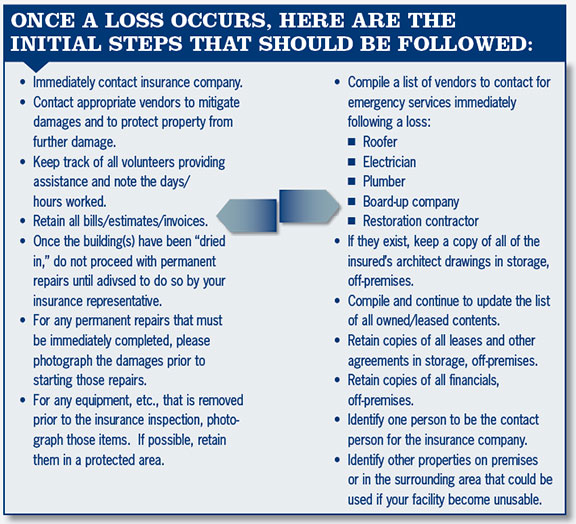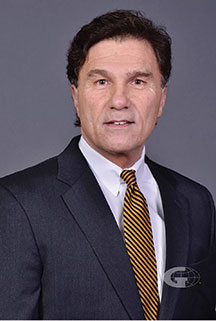
By Peter A. Persuitti
In today’s busy world, many church leaders aren’t taking proactive steps to plan for a catastrophic event.
“When a fire, water or windstorm event occurs, we often find the church community isn’t prepared,” says Steve Boyer, who leads Gallagher Bassett Services’ Claims Operations-Property Practice. “As a result, there endures a long, drawn-out claims adjustment and repair process that didn’t have to happen.”
 For his part, President, National Disaster Interfaiths Network (NDIN), says his group encourages an All-Hazards Risk Assessment process to all churches. He says taking such precautions can get facilities back to their pre-loss condition much sooner.
For his part, President, National Disaster Interfaiths Network (NDIN), says his group encourages an All-Hazards Risk Assessment process to all churches. He says taking such precautions can get facilities back to their pre-loss condition much sooner.
“Long before a crisis, I always suggest ministries reach out for the free advice all around them — from police, fire and emergency management agencies,” Gudaitis adds. “Plus, we have tons of free resources on our website.”
It’s also important to have professional partners that understand your ministries. “Unfortunately, some agents don’t comprehend the complexity,” cautions Ampy Jimenez, a broker and member of the Gallagher Religious Practice in Miami. “In these cases, they’ll suggest coverages through a program they represent — ‘off-the-shelf’ options — versus the more comprehensive coverages (terms & conditions) a church might need. We’re constantly finding duplicity and gaps in coverages.”
Additionally, Jimenez points out that some churches need multiple excess carriers, given their size. In such cases, it’s important that carriers offer the same limits, deductibles and wording. “If there is no consistency, there will be gaps in coverage.”
A church’s agent also needs to make sure the excess carriers drop down when an aggregate is exhausted. “Having a common coordinating adjuster on the policies might also important, Jimenez suggests.
Balance is the bottom line
Ultimately, a church needs to balance the free resources available with relevant experts to validate planning. “There’s no getting around the fact that there will be some costs associated with this proactive approach,” Gudaitis explains.
With the right risk management education and training, churches can evolve to a mindset that understands a crisis isn’t an “if” proposition, but a “when.” Knowledge is power when it comes to protecting the church’s assets, as well as fulfilling the important fiduciary and stewardship obligations churches have to society.
 Peter A. Persuitti is managing director, Religious Practice, at Arthur J. Gallagher & Co. in Chicago.
Peter A. Persuitti is managing director, Religious Practice, at Arthur J. Gallagher & Co. in Chicago.



Sotera’s service offering in performance based design is proudly backed by Dr Paul Clancy who was involved in the introduction of performance based fire engineering to Australia.fire risk assessment